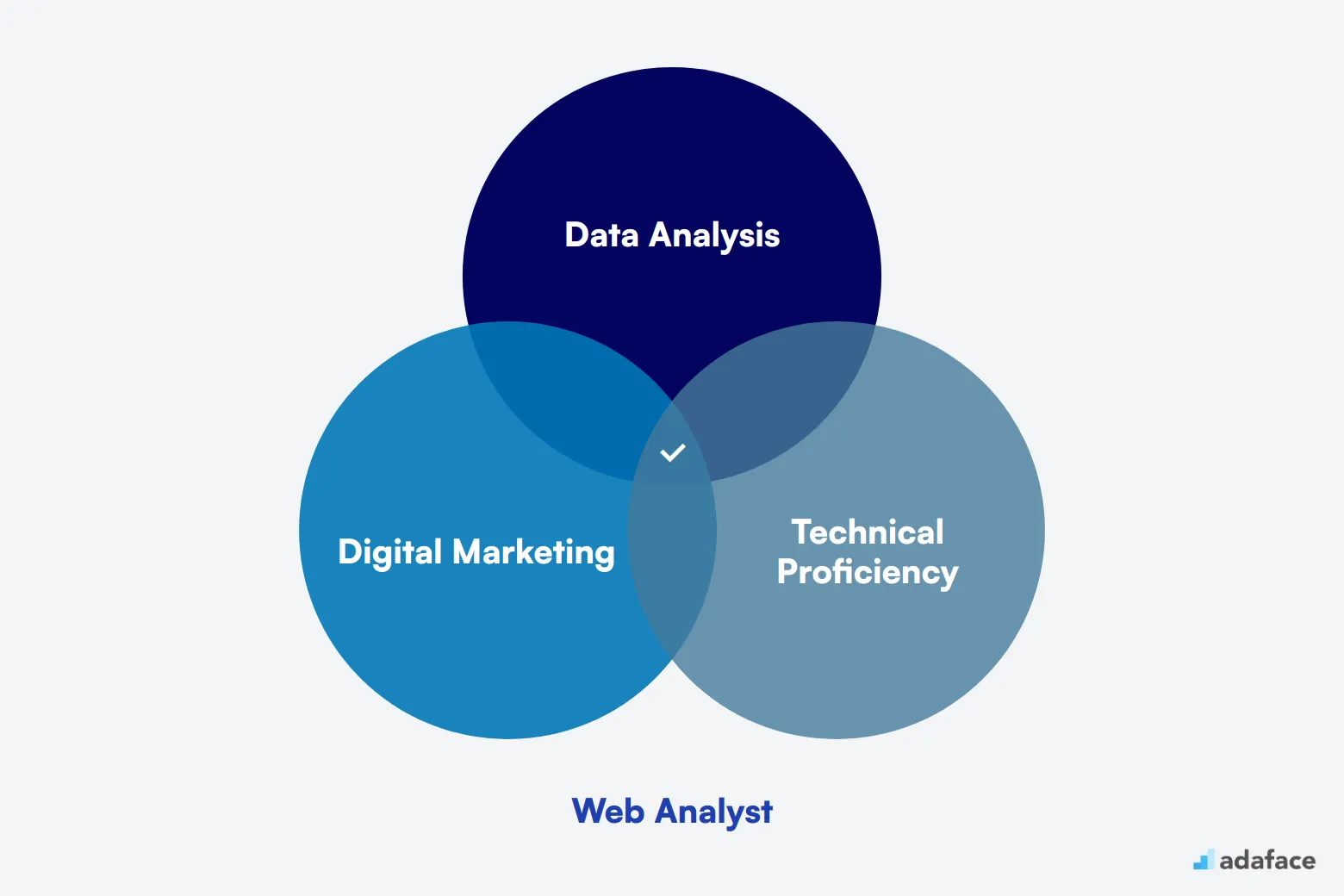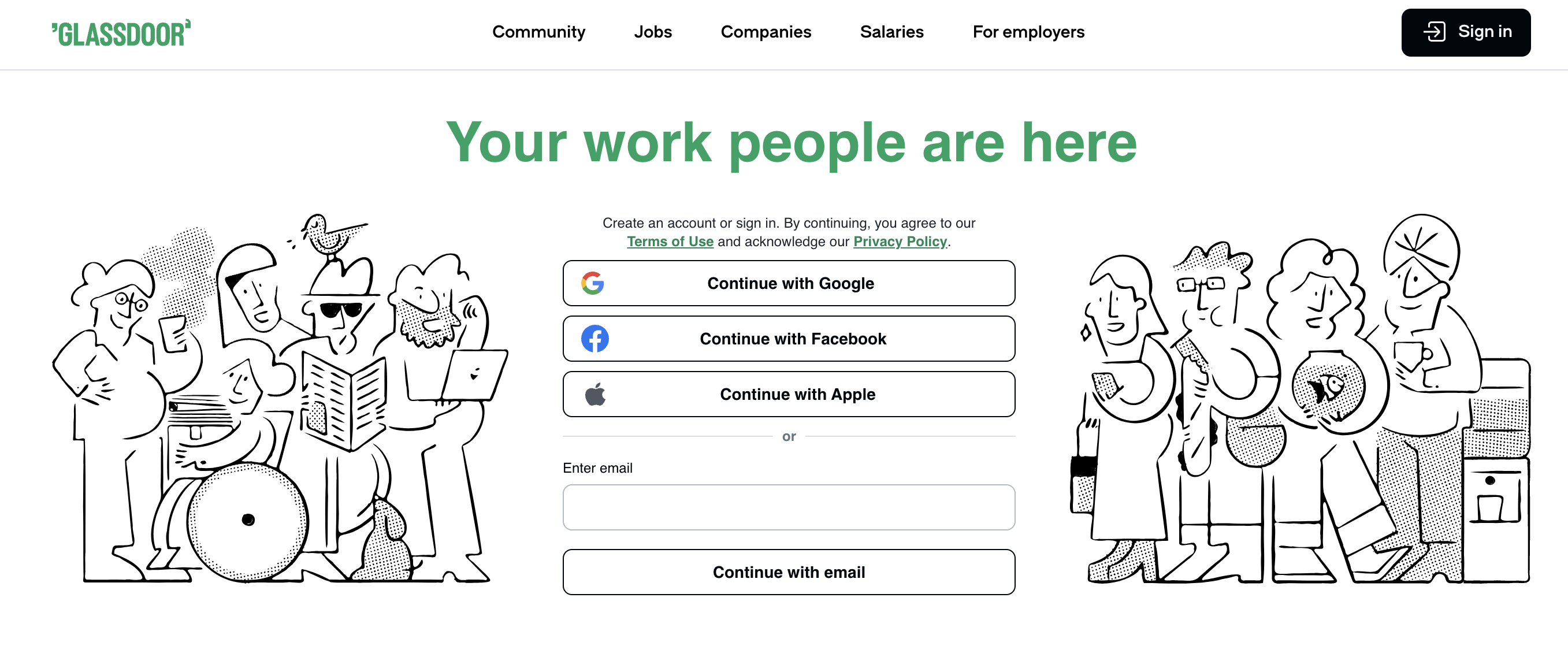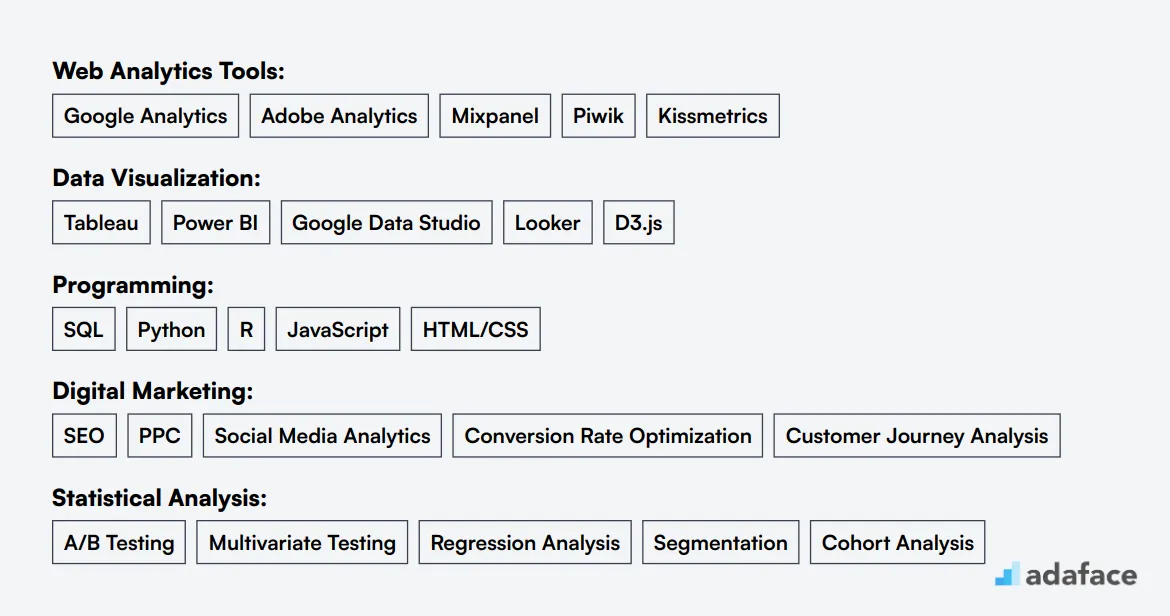As a recruiter or hiring manager, your task is to identify the ideal candidates who can help your team leverage web analytics to drive business growth. A Web Analyst plays a critical role as they convert website data into actionable insights, helping you tailor strategies that align with your business goals. However, it's common for companies to miss the mark by not thoroughly defining the skill sets and qualifications needed for the role. This often leads to hiring the wrong candidate, which can be costly in terms of time and resources.
In this article, we guide you through the process of finding and hiring the best Web Analysts for your team. We'll explore the key responsibilities, skills, and qualifications you should look for, and provide you with practical tips on crafting effective job descriptions. For more detailed insights, you can refer to our skills required for Web Analyst article.
Table of contents
Why Hire a Web Analyst?
Web analysts help businesses make data-driven decisions about their online presence. They can address issues like low conversion rates, high bounce rates, or poor user engagement on your website.
Some key areas where web analysts add value:
- Improving website performance and user experience
- Identifying trends and opportunities in web traffic data
- Optimizing digital marketing campaigns and ROI
Consider hiring a full-time web analyst when you have ongoing needs for data analysis and website optimization. For short-term projects or to test the waters, you might start with a consultant or use an assessment tool to evaluate potential hires.

What does a Web Analyst do?
A Web Analyst plays a key role in understanding and improving website performance. They collect, analyze, and interpret data from various online sources to provide insights that drive business decisions and enhance user experience.
The day-to-day responsibilities of a Web Analyst include:
- Tracking website traffic and user behavior using tools like Google Analytics
- Analyzing data to identify trends and patterns in user engagement
- Creating reports and dashboards to present findings to stakeholders
- Collaborating with marketing and development teams to implement data-driven strategies
- Conducting A/B testing to optimize website elements
- Monitoring and reporting on key performance indicators (KPIs)
- Staying updated with the latest web analytics tools and techniques
Web Analyst Hiring Process
Hiring a Web Analyst typically takes around 1-2 months. Understanding the process can help streamline your effort and ensure you find the right candidate for your team.
- Create a detailed job description: Start by crafting a clear job description that outlines the key responsibilities and required skills for the Web Analyst role. Posting this on relevant job boards is crucial for attracting the right candidates.
- Resume collection and screening: Expect to receive resumes within the first few days. Shortlist candidates based on their qualifications and experience relevant to web analytics.
- Skill testing: Following the resume screening, conduct skill assessments tailored to the role. This could involve practical tests, case studies, or specific assessments related to web analytics tools. Allow about a week for candidates to complete these tests.
- Interviews: Schedule interviews with the shortlisted candidates to assess their fit within your organization. This stage is critical in evaluating both technical skills and cultural fit.
- Offer stage: Once interviews are complete, you can move forward with the best candidate by extending a job offer. Be prepared for potential negotiations during this phase.
Overall, the hiring process can be quite straightforward if you follow these steps. As you move through each phase, remain flexible and responsive to candidate feedback. Now, let's explore these steps in more detail and provide you with handy resources and checklists.
Skills and Qualifications to Look for in a Web Analyst
Creating the ideal candidate profile for a Web Analyst can be tricky. It's easy to mix up what's required with what's just a nice-to-have. To avoid this, you need a clear distinction between these categories in your hiring process.
Start by outlining the must-have skills like a Bachelor's degree in Computer Science or a related field, at least 3 years of experience with web analytics, and proficiency in tools like Google Analytics or Adobe Analytics.
Remember that preferred skills like familiarity with tag management systems or a certification in Google Analytics can add value, but they shouldn't overshadow the foundational requirements of the role.
| Required skills and qualifications | Preferred skills and qualifications |
|---|---|
| Bachelor's degree in Computer Science, Statistics, or related field | Knowledge of A/B testing and experimentation |
| 3+ years of experience in web analytics | Familiarity with tag management systems |
| Proficiency in Google Analytics or Adobe Analytics | Experience with SQL and data querying |
| Strong understanding of digital marketing metrics and KPIs | Understanding of SEO principles |
| Experience with data visualization tools (e.g., Tableau, Power BI) | Certification in Google Analytics or Adobe Analytics |
How to Write an Effective Web Analyst Job Description
Once you've identified the ideal candidate profile for your Web Analyst position, the next step is crafting a compelling job description to attract top talent. Here are some key tips to create a standout Web Analyst job description:
• Highlight key responsibilities: Clearly outline the role's main tasks, such as analyzing website traffic, generating reports, and providing insights for decision-making.
• Balance technical skills with soft skills: While emphasizing proficiency in tools like Google Analytics and SQL, don't forget to mention important soft skills like communication and problem-solving.
• Showcase your company's unique selling points: Highlight what makes your organization special, whether it's cutting-edge projects, growth opportunities, or a supportive work environment.
• Be specific about qualifications: Clearly state required education, years of experience, and any necessary certifications to attract the most suitable candidates.
Top Platforms to Hire Web Analysts
Now that we've crafted a detailed job description for a Web Analyst, the next step is to list it on various job platforms to source candidates. Using the right platforms ensures that you reach the most qualified and suitable candidates for your role.
Ideal for hiring full-time Web Analysts due to its professional networking capabilities and large pool of experienced candidates.

Indeed
A popular job board for finding full-time Web Analysts, offering a wide reach and easy-to-use application features.

Glassdoor
Useful for hiring full-time employees as it provides company reviews and salary insights, attracting informed candidates.

Beyond the initial listings, there are several more platforms that cater to different hiring needs. FlexJobs and Remote Work Hub are excellent choices for those looking to hire remote Web Analysts. Upwork, Toptal, and Freelancer are perfect for finding skilled freelancers for specific projects, while AngelList is a great place to connect with professionals interested in startups. Platforms like Monster offer a vast database of resumes, making it easier to find full-time candidates. For more insights on matching skills to roles, you can explore skills assessment tools.
How to Screen Web Analyst Resumes
Resume screening is a necessary first step in the hiring process to filter out candidates who don't meet the basic requirements. Since the volume of applications can be overwhelming, it helps you narrow down the pool to those who are worth a closer look.

When manually screening resumes, it's important to look for specific keywords that align with the job description. For a Web Analyst, keep an eye out for skills like Google Analytics, data visualization with tools like Tableau or Power BI, and understanding of SEO principles. These keywords can help you quickly identify candidates who have the necessary skills for the role.
To make screening more efficient, using AI tools can be a game-changer. Tools like ChatGPT can assist by highlighting resumes that contain desired keywords. This approach saves time and ensures you don't miss out on any potential candidates due to manual oversight.
Here's a prompt you can use with AI tools to screen resumes:
TASK: Screen resumes to match job description for Web Analyst role
INPUT: Resumes
OUTPUT: For each resume, provide following information:
- Email id
- Name
- Matching keywords
- Score (out of 10 based on keywords matched)
- Recommendation (detailed recommendation of whether to shortlist this candidate or not)
- Shortlist (Yes, No or Maybe)
RULES:
- If you are unsure about a candidate's fit, put the candidate as Maybe instead of No
- Keep recommendation crisp and to the point.
KEYWORDS DATA:
- Web Analytics Tools (Google Analytics, Adobe Analytics)
- Data Visualization (Tableau, Power BI)
- Programming (SQL, Python)
- Digital Marketing (SEO, Customer Journey Analysis)
- Statistical Analysis (A/B Testing, Regression Analysis)
Recommended skills tests to screen Web Analysts
When hiring a Web Analyst, skills tests are an effective way to ensure candidates have the right capabilities for the role. Testing provides a clear, unbiased view of an applicant's abilities, helping you make informed hiring decisions. Here are some recommended tests to consider:
Google Analytics Test: This test helps evaluate a candidate's proficiency in using Google Analytics, a fundamental tool for web analysis. It assesses their ability to interpret data and provide insights crucial for informed decision-making.
Ecommerce Analytics Test: For businesses with an online store, understanding ecommerce data is key. This test measures the candidate's ability to analyze online sales data, track performance metrics, and enhance ecommerce strategies.
AB Testing Test: A/B testing is a critical element in web analysis for optimizing websites. Use this test to gauge the candidate's skills in designing, conducting, and interpreting A/B tests, ensuring they can enhance user experiences effectively.
Data Analysis Test: Understanding data patterns and deriving actionable insights is the core of web analytics. This test checks the candidate’s capability to perform data analysis using statistical tools and methodologies.
Use these tests as part of your online assessment platform to streamline your hiring process and find the right Web Analyst to drive your business forward.
Case Study Assignments to Hire Web Analysts
Case study assignments can be effective for assessing Web Analysts, but they come with drawbacks. They're often time-consuming, leading to lower completion rates and potentially losing good candidates. Despite these challenges, well-designed case studies can provide valuable insights into a candidate's skills and problem-solving abilities.
Web Traffic Analysis: This case study involves analyzing a website's traffic data using tools like Google Analytics. Candidates are asked to identify trends, user behavior patterns, and areas for improvement. This assignment tests their ability to extract meaningful insights from raw data and make data-driven recommendations.
Conversion Rate Optimization: In this assignment, candidates are presented with an e-commerce website's data and asked to propose strategies to improve conversion rates. This case study evaluates their understanding of user experience, A/B testing, and data analysis techniques.
Marketing Campaign Analysis: This case study focuses on evaluating the performance of various marketing channels. Candidates are given data from different marketing campaigns and asked to analyze their effectiveness, ROI, and suggest optimizations. This assignment assesses their ability to work with cross-channel data and provide actionable insights for marketing strategies.
How to structure interviews for hiring Web Analysts
Once candidates successfully pass the skills tests, the next step is to conduct technical interviews to verify their hard skills. Skills tests are great for filtering out unqualified candidates, but interviews help identify those best suited for the role. This stage involves probing deeper into their technical expertise and problem-solving abilities.
Here are some sample interview questions for web analysts: What are the most important metrics you track with Google Analytics, and why? This question helps assess their understanding of key analytics tools. Can you describe a situation where you improved a website's performance through analysis? This reveals their experience and impact in previous roles. How would you use SQL to extract specific data sets for analysis? This tests their technical skills with databases. In your opinion, what are the current trends in web analytics? This shows their awareness of the field's evolution. Finally, how do you prioritize tasks when dealing with multiple projects? This evaluates their organizational skills. These questions are designed to assess both technical knowledge and problem-solving capabilities, which are crucial for a web analyst. For more detailed interview guidance, explore web analyst interview questions.
What's the difference between a Web Analyst and a Digital Analyst?
People often confuse Web Analysts and Digital Analysts because both roles involve data analysis and play significant parts in optimizing online performance. However, they focus on different areas and use distinct tools to achieve their goals.
A Web Analyst primarily targets website performance. They use tools like Google Analytics and Adobe Analytics to track metrics such as page views and bounce rates. Their main goal is to optimize user experience and enhance website functionality. Their technical skills often include knowledge of HTML and JavaScript, facilitating the creation of comprehensive website usage reports.
In contrast, a Digital Analyst focuses on digital marketing channels. Their toolbox includes Google Ads and Facebook Insights, helping them monitor click-through rates and conversion rates. They aim to increase online reach and brand visibility, often requiring skills in SEO and SEM. Reporting here revolves around campaign performance, utilizing data from social media and PPC campaigns.
For more insights on the skills required for web analysts, explore our dedicated blog post.
| Web Analyst | Digital Analyst | |
|---|---|---|
| Focus Area | Website Performance | Digital Marketing Channels |
| Tools | Google Analytics, Adobe Analytics | Google Ads, Facebook Insights |
| Key Metrics | Page Views, Bounce Rate | Click-Through Rate, Conversion Rate |
| Data Sources | Website Traffic Data | Social Media and PPC |
| Primary Goal | Optimize User Experience | Increase Online Reach |
| Technical Skills | HTML, JavaScript | SEO, SEM |
| Reporting | Website Usage Reports | Campaign Performance Reports |
| Business Impact | Website Functionality | Brand Visibility |
What are the ranks of Web Analysts?
The role of a web analyst is often confused with other data-related positions, leading to misunderstandings about their specific responsibilities. Understanding the different ranks can help clarify these distinctions and ensure that organizations hire the right talent for their needs.
• Junior Web Analyst: This entry-level position focuses on data collection and basic analysis. Junior web analysts typically assist more senior analysts by preparing reports and performing routine tasks under supervision.
• Web Analyst: At this level, professionals take on more responsibility for data analysis and interpretation. They analyze website performance metrics, generate insights, and play a vital role in guiding marketing strategies.
• Senior Web Analyst: Senior analysts have extensive experience in web analysis and are responsible for more complex data projects. They mentor junior analysts and lead strategic initiatives, making key recommendations based on their findings.
• Lead Web Analyst: This role involves overseeing a team of analysts and being involved in high-level decision-making. Lead web analysts collaborate with other departments to ensure alignment of data insights with business objectives.
• Web Analytics Manager: The manager position encompasses all aspects of web analytics, including strategy development, team management, and cross-departmental communication. They ensure that analytics efforts align with overall business goals and drive performance improvements.
Hire the Best Web Analysts for Your Team
In this guide, we've covered the key aspects of hiring web analysts, from understanding their role to crafting effective job descriptions and conducting interviews. We've explored the skills and qualifications to look for, as well as the best platforms to find top talent in this field.
If there's one key takeaway, it's the importance of using accurate job descriptions and skills tests to make your hiring process more precise. By implementing these strategies, you'll be well-equipped to identify and hire the best web analysts who can drive data-driven decisions and boost your organization's online performance.
Web Developer Test
FAQs
A Web Analyst is responsible for analyzing website data to provide actionable insights, improving the user experience, and supporting digital marketing strategies.
Key skills include proficiency in analytics tools, data interpretation, communication skills, and an understanding of digital marketing principles.
Highlight the main responsibilities, required skills, experience level, and any relevant technical qualifications. Be specific about your company's needs and goals.
You can find Web Analysts on job platforms, professional networking sites, and through industry-specific recruiting agencies. You may also consider attending relevant industry events and webinars.
While both roles analyze data to drive digital strategies, a Web Analyst focuses on website data specifically, whereas a Digital Analyst has a broader scope, including multiple digital channels.
You can use technical skills assessments, situational case studies, and structured interviews to evaluate a candidate's analytical capabilities and problem-solving skills.
A Web Analyst should be proficient in tools like Google Analytics, Adobe Analytics, Excel for data analysis, and possibly programming languages like SQL or Python.

40 min skill tests.
No trick questions.
Accurate shortlisting.
We make it easy for you to find the best candidates in your pipeline with a 40 min skills test.
Try for freeRelated posts
Free resources



